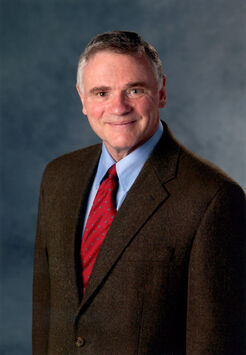Introduction[]
Leroy Hood, an American biologist, currently located in Seattle, WA is well known for his commitment to making science unde

Leroy Hood
rstandable and available to everyone. Born October 1938 in Missoula Montana, he went on to earn a plethora of degrees including his MD in biochemistry from John Hopkins University in 1964, a PhD in biochemistry in 1968 and his D.Sc. from Bates college in 1999. Hood once received the following piece of advice from his instructor, "If you want to practice biology, do it on the leading edge and if you want to be on the leading edge, invent new tools for deciphering biological information", and that is exactly what he did.
Career and Achievements[]
He started his career at Caltech, which is where he began his work on an automated DNA sequencer & synthesizer and a protein sequencer and synthesizer. He subsequently won the Lemelson-MIT prize in 2003 for his development of the DNA sequencer. The sequencer works by tagging each DNA nucleotide with an individual fluorescent dye that glows red, green, blue or orange when exposed to a laser and then sending the color signals back to the computer for analysis. His invention of the DNA sequencer has since revolutionized the field of genetics and genomics. Dr. Hood has also been given credit of invented the field of systems biology, which is defines as "the interplay between biology, technology and computation."
Considering his technology developments it's no wonder he was a key player in the initiation and development of the Human Genome Project. He also played a huge role in founding more than fourteen biotechnology companies, including Amgen, Applied Biosystems, Darwin, The Accelerator and Integrated Diagnostics.
He has won many awards for his research and contributions to biomedical science and technology and in 2007, was awarded a spot in the National Inventers Hall of Fame. These are not his only awards! He has also won the 1987 Lasker Prize for his studies on the mechanism of immune diversity; the Association of Biomolecular Resource Facilities Award for outstanding contributions to Biomolecular Technologies in 2000; the 2002 Kyoto Prize in Advanced Technology for technology development; in 2006 the 12th Annual Heinz Award in Technology, the Economy and Employment for his extraordinary breakthroughs in biomedical science; and the 2006 Wharton Infosys Business Transformation Award for his society-transforming use of information technology.
Dr. Hood is a member of the National Academy of Sciences, the National Academy of Engineering, and the Institute of Medicine. He is one of only 10 people in the world to be elected to all three academies. To top it all off, Dr. Hood has also received 17 honorary degrees from prestigious universities worldwide.
Dr. Hood is currently the president and co-founder of the Institute for Systems Biology in Seattle Washington where his research is focused on systems approaches to biology and medicine. His newest big project is what he calls genetic based P4 Medicine; short for predictive, preventative, personalized and participatory, Hood claims this is the largest challenge of this life. Not surprisingly he has published over 700 papers and has co-authored many books on biochemistry, immunology, molecular biology and genetics.
So Who IS This Man?[]
In an interview with Xconomy, Hood states that he still get by on 4 or 5 hours of sleep a night. His typical daily schedule involves waking up at 4-5am to do work on his laptop for a few hours. Then he heads down to Pikes Place Market where he goes to the gym for about an hour. He arrives at the office between 7-9a at which point he usually has a day of back-to-back meetings. He enjoys a working lunch and consumes no more than 2 cups of coffee a day. He says that the work they are doing is so stimulating he doesn't need much to keep him awake. He gets home around 5-6p where he sometimes does more work, but other times enjoys a relaxing evening with a book, his wife, Valerie Logan, or just his thoughts. He enjoys an active social life and is a big fan of the Seattle Art Museum.
I highly suggest reading the whole Xconomy interview because it provides a nice look into the life of Leroy Hood.
References:
- Wikipedia
- Institute for Systems Biology. Bio of Leroy Hood.
- MIT Winners Circle. Leroy Hood.
- Heinz Award
- Xconomy. Interview with Leroy Hood. 10 Oct 2008.